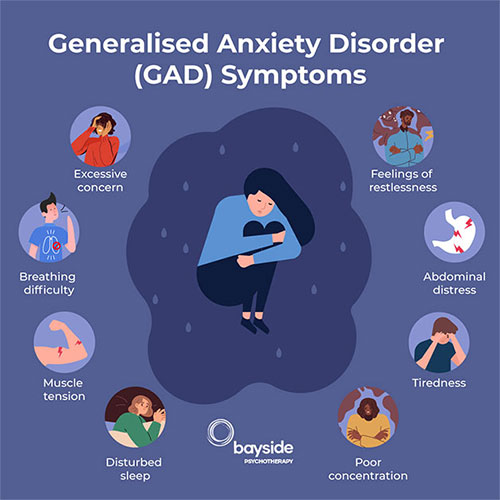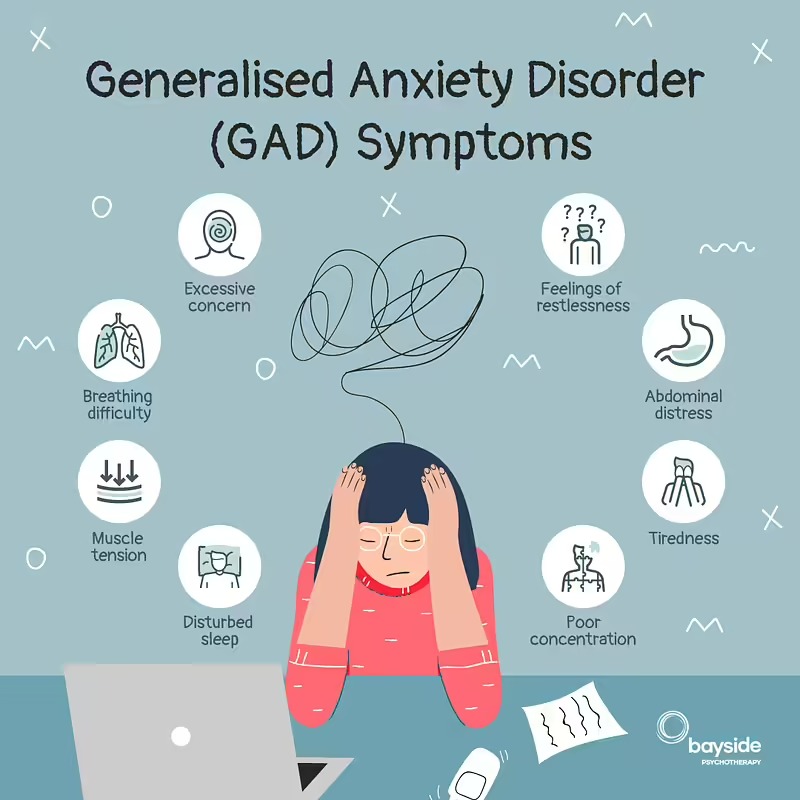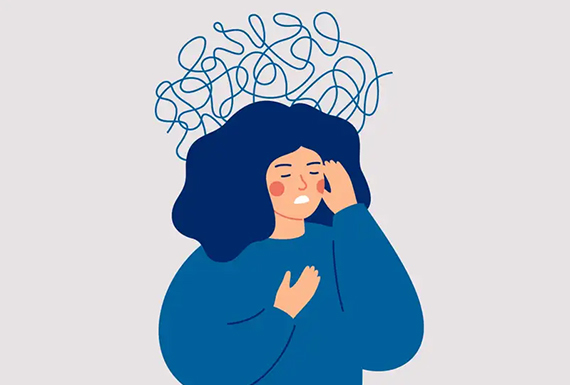Checking Out Various Approaches in Therapy for Anxiousness Disorder for Long-term Change
When taking on anxiousness problems, it's necessary to check out a range of therapy strategies. Each approach offers special insights and tools to aid you handle your symptoms successfully. You could locate that incorporating techniques can generate the best outcomes. Comprehending the nuances of these techniques is essential to promoting long lasting modification. What happens if the appropriate combination could launch a new degree of psychological well-being for you?
Recognizing Stress And Anxiety Disorders: A Short Summary
Stress and anxiety conditions, which influence millions of people worldwide, can significantly influence day-to-day live. You might experience frustrating feelings of worry or worry that appear irrepressible. These feelings can cause physical signs like an auto racing heart, sweating, or perhaps lightheadedness. Usual kinds of anxiety problems include generalised stress and anxiety disorder, panic attack, and social anxiousness condition. Each has distinct indicators, however they all share a tendency to disrupt your regular and relationships.Understanding the origin of your anxiousness is essential. It could stem from genes, mind chemistry, or life experiences. Acknowledging your triggers can aid you handle your actions much better. It is essential to bear in mind that you're not alone in this battle. Lots of people face similar difficulties, and looking for assistance is a strong action towards feeling much better. By finding out about anxiousness conditions, you're already on the course to understanding and managing your condition more properly.
Cognitive-Behavioral Treatment: Challenging Negative Thought Patterns
In Cognitive-Behavioral Therapy, you'll start by determining the adverse thought causes that add to your anxiousness. Once you acknowledge these ideas, you'll deal with replacing them with even more positive choices. With each other, you'll construct reliable coping techniques to help manage your stress and anxiety in everyday circumstances.
Recognizing Adverse Thought Triggers

Identifying the certain triggers behind your adverse thoughts can be vital in taking care of anxiety when you run into minutes of distress. Beginning by paying attention to situations that provoke sensations of worry or concern. Is it a congested area, a future target date, or a conversation with certain people? Write down these circumstances in a journal. This will assist you recognize patterns in your thinking. Likewise, notice physical experiences that accompany your unfavorable ideas, like an auto racing heart or tightness in your chest. By pinpointing these triggers, you gain understanding right into what's fueling your stress and anxiety. Recognizing these connections is the primary step in challenging those ideas and ultimately restoring control over your psychological responses.
Replacing Thoughts With Positives
Testing adverse thought patterns is a vital action in changing your state of mind and decreasing anxiousness. You might usually locate on your own trapped in cycles of self-doubt or disastrous thinking. Rather than allowing these ideas dictate your feelings, practice replacing them with practical alternatives or favorable affirmations. For circumstances, when you think, "I can't manage this," change it to, "I can handle challenges one step at once." This straightforward change can substantially affect your mood. Frequently identifying and responding to these adverse thoughts aids develop a much healthier interior dialogue. Bear in mind, it takes some time and initiative, however constantly exercising this strategy can cause enduring adjustment, encouraging you to face anxiousness with restored confidence and resilience.
Building Coping Techniques With Each Other
Replacing negative ideas is just the beginning of handling anxiousness successfully. To produce enduring adjustment, you require to build coping methods that empower you. Cognitive-Behavioral Therapy (CBT) helps you determine and test those purposeless idea patterns. Together, you and your therapist can explore how these thoughts impact your feelings and behaviors.Start by establishing sensible techniques, like journaling or mindfulness workouts, that enable you to challenge anxiety head-on. When you encounter your concerns progressively, you'll discover to respond differently.

Mindfulness and Acceptance-Based Approaches: Cultivating Present-Moment Awareness
As you navigate the intricacies of stress and anxiety, including mindfulness and acceptance-based approaches can significantly boost your ability to cultivate present-moment awareness. By concentrating on the present moment, you'll find that you can observe your thoughts and feelings without judgment (Counseling services for anxiety). This technique aids you recognize your anxiousness without really feeling overwhelmed by it.Engaging in mindfulness exercises, such as deep breathing, body scans, or directed reflections, enables you to ground yourself in your present experience. Acceptance-based approaches encourage you to embrace your feelings instead of battle against them. They shed their power over you.Incorporating these methods right into your daily regimen can transform exactly how you respond to stress and anxiety when you accept your sensations. You'll create strength and find out to browse stressful situations with greater ease. Inevitably, cultivating present-moment awareness lays the foundation for long-term adjustment, encouraging you to lead a more meeting life
Exposure Therapy: Facing Fears Progressively
Exposure therapy assists you face your concerns in a steady means, making it less overwhelming. You'll find out strategies to face anxiety-provoking circumstances step by step, while likewise constructing coping techniques to handle your responses. This approach equips you to take control and decrease anxiety with time.
Steady Direct Exposure Methods

When facing anxiousness, progressively confronting your worries can be an effective way to reclaim control. This method, known as steady direct exposure, entails slowly exposing on your own to the situations or things that trigger your anxiety. Beginning with much less daunting circumstances and progressively work your method as much as more difficult ones. If you're worried of public talking, you could begin by talking in front of a mirror, then advance to sharing ideas with a close friend, and at some point resolve a little team. Each action aids desensitize you to the fear, developing your self-confidence gradually. Keep in mind, it's important to speed on your own and celebrate little victories as you move via this procedure, reinforcing your capability to manage anxiety properly.
Building Coping Methods
Structure reliable coping strategies is crucial for taking care of stress and anxiety, specifically as you face your anxieties gradually - Counseling services for anxiety. One effective approach is direct exposure treatment, where you start by encountering your concerns in a controlled fashion. Begin with much less daunting circumstances and slowly function your way approximately more difficult circumstances. This progressive exposure aids desensitize you to stress and anxiety activates, making them less overwhelming.Incorporate relaxation strategies, such as deep breathing or mindfulness, to relax your mind during exposure. Track your progress, celebrating little success along the way to enhance your self-confidence. Keep in mind, it's alright to take your time; the goal isn't perfection but constant renovation. By developing these strategies, you'll equip yourself to navigate anxiety and welcome life extra totally
Psychodynamic Treatment: Uncovering Source of Anxiety
Psychodynamic therapy checks out my response the subconscious mind, disclosing the origin of your anxiousness. By examining your thoughts, feelings, and past experiences, this method assists you uncover underlying problems and unsettled problems that might contribute to your existing anxiety. You'll deal with a therapist to examine childhood experiences, relationships, and emotional patterns that form your reactions today.As you get understanding into these much deeper layers of your subconscious, you'll start to acknowledge how previous occasions influence your existing actions. This understanding can result in catharsis, allowing you to process feelings you might have suppressed.Through the restorative partnership, you can likewise recognize defense reaction that may have established over time, supplying a more clear course to alter. Eventually, psychodynamic therapy furnishes you with the tools to address your anxiousness at its core, advertising long-term transformation in your psychological well-being.
Integrative and All Natural Methods: Incorporating Techniques for Greater Efficiency
Incorporating various restorative methods can enhance your journey towards managing anxiety better. By incorporating elements from cognitive-behavioral therapy, mindfulness methods, and all natural strategies, you can create an individualized method that addresses your special demands. As an example, you could utilize cognitive-behavioral strategies to challenge unfavorable thought patterns while including mindfulness workouts to ground on your own in the existing moment.Additionally, exploring holistic practices such as yoga exercise or meditation can advertise leisure and decrease anxiousness signs. This mix enables you to develop better self-awareness and resilience.Experimenting with these diverse approaches can assist you uncover what reverberates most with you. Remember, it's concerning locating a synergy that works, instead of staying with a solitary strategy. This integrative approach not only uses immediate alleviation yet likewise promotes long-term skills for taking care of anxiousness, encouraging Website you to redeem control over your life.
The Duty of Support Systems: Building Durability Through Connection
While it could seem that managing anxiousness is a singular trip, having a solid support group can play a necessary role in your resilience. Surrounding on your own with empathetic close friends, family, or support system produces a risk-free area where you can openly share your experiences and sensations. You remind yourself that you're not alone in this struggle.These partnerships use encouragement and can offer practical coping approaches that have worked for others when you link with others. It's likewise an opportunity to obtain viewpoint; close friends can aid you see scenarios in a different way, minimizing sensations of isolation.Moreover, psychological assistance cultivates a sense of belonging, which can considerably alleviate anxiousness symptoms. By leaning on your support look at this site system, you can develop resilience and deal with difficulties a lot more properly. Keep in mind, getting to out for help signifies strength, and it can make all the distinction in your journey toward handling anxiety.
Often Asked Questions
What Are the Usual Signs of Anxiety Disorders?
You may experience restlessness, fatigue, difficulty concentrating, irritation, muscular tissue tension, and rest disturbances. Physical signs can consist of quick heart beat, sweating, and trembling. Acknowledging these signs early can help you seek suitable support and therapy.
How Much Time Does Therapy Usually Last for Anxiousness Problems?
Treatment for anxiousness problems typically lasts anywhere from a couple of weeks to numerous months. It truly depends on your individual requirements, development, and the methods your specialist utilizes to aid you handle your anxiety efficiently.
Can Medication Be Used Alongside Therapy for Anxiousness?
Yes, medication can most definitely be utilized alongside treatment for anxiousness. Integrating both strategies frequently improves treatment effectiveness, helping you take care of signs and symptoms while discovering underlying concerns via therapy (Counseling services for anxiety). Always consult your doctor for tailored recommendations
Exist Self-Help Approaches for Handling Anxiousness?
Yes, there are several self-help strategies for handling anxiety. You can exercise mindfulness, take part in routine workout, keep a balanced diet regimen, establish a routine, and use deep breathing techniques to help in reducing anxiousness symptoms effectively.
Just how Do I Know if I Need Professional Help for Stress And Anxiety?
